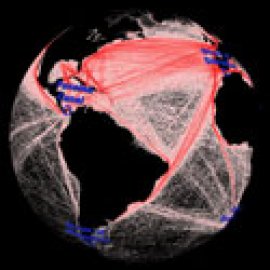Ratification of the High Seas Treaty
-
English
-
ListenPause
[intro music, ocean sounds]
Welcome to World Ocean Radio…
I’m Peter Neill, Founder of the World Ocean Observatory.
I have often expressed here on World Ocean Radio my frustration with the international failure to transform policy, based on science, into action in the form of treaty, the shared legal obligation by nations to agree, apply, and enforce protections of marine resources worldwide. The problem has been usually explained by the failure to ratify by governments, influenced by international corporations particularly invested, indeed highly dependent, on the perpetuation of conditions addressed and prohibited by the proposed binding agreements. China, the United States, Russia, India are among the nations with such vested interest, thus are the usual subverters voting against, or not voting to accept at all, the inherent solution to a critical global problems addressed, such as illegal fishing, plastics regulation, human rights protections, oil and gas emissions, industrial pollution, water pollution, and biodiversity protection. [The usual explanation is that the treaty is an imposition on national sovereignty, thus antithetical to narrow national interest and unacceptable no matter the agreement by the larger community of nations.]
This failure is at the epicenter of the climate crises and ongoing corruption of the world ocean.
Last week, Morocco became the 60th nation to ratify the High Seas Treaty, a two-decades long process to establish and protect the vast complex of biodiversity sustained by the ocean across 70% of the earth’s surface. Suffice it to say that this is a huge step forward, uniting many rules promoted by many UN agencies under a single rubric and framework for coherent protection. [The goal is to extend this international law toward a goal of raising protection from 10% of the ocean to 30% by 2030, long a goal of ocean advocates worldwide.]
The United States has ratified the treaty under the Biden Administration. American agencies, non-profits, and environmental groups were active participants in the process. As with so many things, that position has been modified and diluted by the current administration by budget reductions at the National Ocean and Atmospheric Agency, withdrawal of marine science research grants, and executive orders and political positions that contradict the tenets of the treaty, for example restrictions on deep sea mining that are now being actively promoted in contradiction.
The treaty’s main purpose is to create areas for marine protection to include fragile and biodiverse deep-sea species, genetic resources essential to ocean sustainability, migratory animals in deep water transit, and applications for future quality of life and human health through new discoveries relating to medicine, food production, and biotechnology. It is an expression of the “precautionary principle,” defined by the Encyclopedia Britannica as an “approach in policy making that legitimizes the adoption of preventative measures to address potential risks to the public or environment associated with certain activities or policies.” The history of the principle is further described as follows: “The concept of the precautionary principle emerged in the 1970s–80s in German environmental law… in 1987, it was incorporated into international law at the International Conference on the Protection of the North Sea. Since then, it has permeated most international environmental conventions. For example, entrenched by the 1992 Rio Declaration, written into the United Nations Framework Convention on Climate Change and, retroactively, into the Protocol on Substances that Deplete the Ozone Layer. It was integrated into the criteria for the listing of endangered species by the Convention on International Trade in Endangered Species in 1994, and the following year it was adopted by the Food and Agriculture Organization of the United Nations. The precautionary principle is also a cornerstone of European Union (EU) environmental law and has been central in determining the EU’s position toward genetically modified organisms. The EU has also advocated its extension to other areas, such as food and health issues.”
Anyone following present national and international politics will see the problem. There is a distinct tilt in the discussion that confronts an alternative approach based on unrestricted market and profit-driven consumption and measured by Gross National Product indifferent to long-term sustainability and future outcomes.
And so, here we are again: returned to the old perspectives and arguments, that slow, familiar gyre that counters change, promotes regress over progress, denies science, and abandons the logic of self-perpetuation to the immediacy of gratification and financial return. Thanks, Morocco, for your key vote for ratification. What more will it take?
We will discuss these issues, and more, in future editions of World Ocean Radio.
WORLD OCEAN RADIO IS DISTRIBUTED BY THE PUBLIC RADIO EXCHANGE AND THE PACIFICA NETWORK, FOR USE BY COLLEGE AND COMMUNITY RADIO STATIONS WORLDWIDE. FIND US WHEREVER YOU LISTEN TO PODCASTS, AND AT WORLD OCEAN OBSERVATORY DOT ORG, WHERE THE FULL CATALOG OF MORE THAN 700 RADIO EPISODES IS SEARCHABLE BY THEME.
[outro music, ocean sounds]This week on World Ocean Radio we are discussing the September 2025 news that Morocco has become the 60th nation to ratify the High Seas Treaty, a two-decades long process to establish and protect a vast complex of biodiversity in international waters. This is a major milestone and a huge step forward, uniting many rules promoted by many UN agencies under a single rubric and framework for coherent protection.
About World Ocean Radio
World Ocean Radio is a weekly series of five-minute audio essays available for syndicated use at no cost by college and community radio stations worldwide. Peter Neill, Founder of the World Ocean Observatory and host of World Ocean Radio, provides coverage of a broad spectrum of ocean issues from science and education to advocacy and exemplary projects.
World Ocean Radio
15 Years, 760+ Episodes
Ocean is climate
Climate is ocean
The sea connects all things
- Login to post comments



